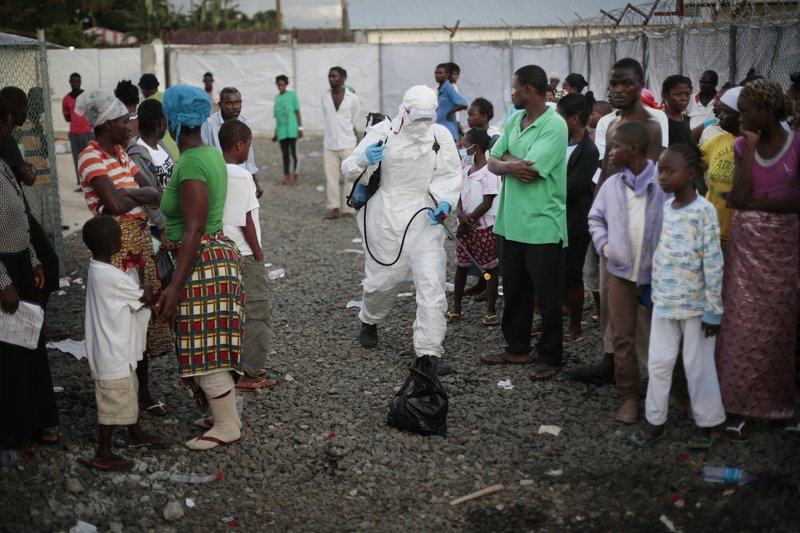LONDON -- According to internal documents obtained by The Associated Press, the U.N. health agency routinely has spent about $200 million a year on travel expenses, more than what it doles out to fight some of the biggest problems in public health, including AIDS, tuberculosis and malaria combined.
For example, Dr. Margaret Chan, director-general of the World Health Organization, traveled to Guinea earlier this month to join the country's president in celebrating the world's first Ebola vaccine.
After praising health workers in West Africa for their triumph over the lethal virus, Chan spent the night in the presidential suite at the beach-side Palm Camayenne hotel. The suite, equipped with marble bathrooms and a dining room that seats eight, has an advertised price of $1,008 per night.
Some say such luxurious accommodations send the wrong message to the rest of WHO's 7,000 staff members -- and may hurt the cash-strapped health agency's fundraising efforts to fight diseases worldwide.
Last year, WHO spent about $71 million on AIDS and hepatitis. It devoted $61 million to malaria. To slow the spread of tuberculosis, WHO invested $59 million. Still, some health programs do get exceptional funding -- the agency spends about $450 million trying to wipe out polio every year.
WHO declined to say if it paid for Chan's stay at the Palm Camayenne in Conakry, but noted that host countries sometimes pick up her hotel tabs.
At a time when the health agency is pleading for more money to fund its responses to health crises worldwide, it has struggled to get its travel costs under control. Senior officials have complained internally that U.N. workers break new rules aimed at curbing its expansive travel costs, booking perks such as business-class airplane tickets and rooms in five-star hotels with few consequences.
Despite WHO's numerous travel regulations, Nick Jeffreys, WHO's director of finance, said the agency couldn't be sure its workers always booked the cheapest fares or that their travel was even warranted. Jeffreys spoke during a September 2015 in-house seminar on accountability -- a video of which was obtained by the AP.
Earlier that year, a memorandum was sent to Chan and other top leaders with the subject line "actions to contain travel costs" in capital letters. The memo reported that compliance with rules requiring travel to be booked in advance was "very low." The document also pointed out that WHO was under pressure from its member countries to save money.
Travel would always be necessary, the memo said, but "as an organization we must demonstrate that we are serious about managing this appropriately."
In a statement to the AP, the U.N. health agency said "the nature of WHO's work often requires WHO staff to travel" and that costs were reduced 14 percent last year compared with the previous year -- although the 2015 total was exceptionally high due to the 2014 Ebola outbreak in West Africa.
Since 2013, WHO has paid $803 million for travel. WHO's approximately $2 billion annual budget is drawn from the taxpayer-funded contributions of its 194 member countries; the United States is the largest contributor.
After he was elected, U.S. President Donald Trump tweeted that "The UN has such great potential," but had become "just a club for people to get together, talk, and have a good time. So sad!"
WHO said Sunday that nearly 60 percent of its travel costs were spent on sending outside experts to affected countries and for national representatives to attend WHO meetings.
Other international aid agencies, including Doctors Without Borders, explicitly forbid their staff from traveling in business class. Even the charity's president must fly in economy class. With a staff of about 37,000 aid workers versus WHO's 7,000 staffers, Doctors Without Borders spends about $43 million on travel a year.
The U.S. Centers for Disease Control and Prevention would not provide its travel costs, but said its workers are not allowed to fly business class unless they have a medical condition. The U.N. children's agency UNICEF, which has about 13,000 workers, said it spent $140 million on global travel in 2016.
Dr. Ashish Jha, director of the Global Health Institute at Harvard University, warned that WHO's travel spending could have significant consequences for fundraising. Several weeks ago, WHO asked for about $100 million to save people in Somalia from an ongoing drought. In April, it requested $126 million to stop the humanitarian catastrophe in Yemen.
A Section on 05/23/2017
